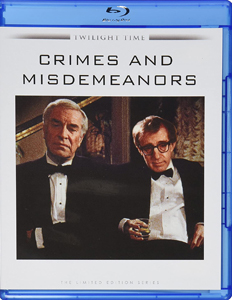In “Crimes and Misdemeanors” (1989), Woody Allen makes such a personal thesis statement on two of his favorite topics – heartbreak and the inner price of committing a murder – that he could’ve ended his career right here.
Core Allen issues
He didn’t get these issues out of his system, which is a boon for us, as we’ve been more recently treated to the likes of “Café Society” (heartache) and “Match Point” (the moral cost of killing). But “C&M” can only be equaled, not surpassed.
It’s actually two engrossing, alternating movies – linked only in that they both take place in 1989 New York City. In one, Martin Landau’s Judah finds himself in too deep in his affair with Anjelica Huston’s Dolores, who starts to demand more from him.

“Crimes and Misdemeanors” (1989)
Director: Woody Allen
Writer: Woody Allen
Stars: Martin Landau, Woody Allen, Mia Farrow
In the other, Allen’s married Cliff falls hard for Mia Farrow’s Halley on a documentary set. They are filming uber-successful but pretentious comedy filmmaker Lester (Alan Alda). He keeps reminding everyone that “Comedy is tragedy plus time.”
Allen’s films were starting to get more beautiful around this time. Cinematographer Sven Nykvist gives us two particularly gorgeous sequences. Judah and Dolores breathlessly run along the beach at sunset, and Cliff and Halley talk on a park bench in the crisp autumn air. Both sequences capture the way nature can conspire with romance.
Those moments are all the more gorgeous because “C&M” is grounded overall, co-starring a who’s who of earthy NYC actors, including later “Law & Order” legends Jerry Orbach and Sam Waterston. The situations are particularly stark – rather than cinematic – by the end, where “C&M” earns two final twists.
From a certain point of view
“C&M” is one of those men’s-POV movies that some people criticize simply based on that fact. It shows Cliff’s (ultimately one-sided) love story with Halley with devastating emotional truth.
We only get one point-of-view in life. Sometimes we get hints of what other people are thinking. Indeed, the main character absorbs other POVs in “Another Woman,” Allen’s masterpiece from just before this one.
But even then, we’re a slave to our inner thoughts, which can become unrealistically hopeful if we spend too much time with them. Nykvist shoots Farrow more beautifully than ever, and the Cliff-Halley scenes are endearingly natural to the point where I want to hug both of them. On a whim, rather than a planned date, they eat take-out while watching an old film on a projector.
The mystery of Lester
Meanwhile, Cliff loathes Lester, who is focused on his image and prone to womanizing. But is he the embodiment of evil like Cliff thinks he is? Upon my initial viewing, I wished “C&M” had given us more moments of Lester being a bad guy so we can hate him, or a great guy so we can like him.

But on further reflection, Allen shows smart restraint by making Lester essentially neutral. If we take a step back, he’s not that bad. (Indeed, there’s room for womanizing even in the broad definition of The Allen Character.)
Lester is mainly just different from Cliff, a neurotic romantic — and a self-focused one. His proposal to Halley reveals as much: “Marry me. That’s the only thing that will satisfy me.”
When Cliff stares in genuine shock at the situation revealed at “C&M’s” end, it will ring true to many viewers. It’s tempting to wield blame and to label people as good or bad. But one-sided romances happen. There’s room to sympathize with Cliff while also recognizing that Halley isn’t evil.
Tragedy plus time
In Judah’s story, Allen lets himself be stylish. As Judah mulls his dilemma, Waterston’s rabbi is essentially a good angel on one shoulder.
On the other hand, it doesn’t get much more real than Orbach’s hitman telling Judah that his problems can be over if he just says the word. He knows people who will bump off Dolores for a fee.
As the DVD cover art indicates, Judah and Cliff come together long enough for a conclusive chat at a wedding, where both men know one member of the couple. It clinches the film’s greatness. But even after the credits roll, “C&M” rewards a viewer as we think about the bizarre parallels between these two unconnected stories.
“Crimes and Misdemeanors” is the quintessential Allen film to screen for a newcomer to his catalog. It has crime, romance, religion and morality. The tense outer dramas segue to people’s inner thoughts. It’s dramatic, comedic, tragic and ironic. Allen delivers it with light touches that are nonetheless loaded with observation and meaning.

